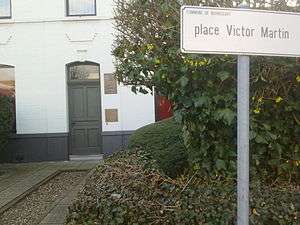Victor Martin
Victor Martin (19 January 1912 – November 1989) was a Belgian academic sociologist, known for his involvement with the Belgian Resistance during World War II.
Using academic networks established before the war, Martin agreed to undertake a spying mission in Nazi Germany on behalf of the Front de l'Indépendance group to find reliable information on the fate of Belgian Jews deported to Eastern Europe. Martin reported his findings about the mass extermination of Jews and was one of the first to provide detailed information on the functioning of Auschwitz concentration camp.
Martin's operation
Martin, who possessed a doctorate, had travelled in Switzerland, France and Germany before the war, and his title had given him access to a network of good contacts in German universities. As a member of the Belgian Resistance and realizing that his mastery of the German language was a trump card, he proposed himself for a secret mission in enemy territory.
Martin's proposal was accepted, but the mission was different from what he had imagined; at the request of the officials of the Comité de Défense des Juifs, he was ordered to observe directly where the trains went which carried the deported Jews of Belgium. He manufactured a project researching the psychology of different social classes as cover. He obtained meetings with the sociologist Leopold von Wiese at Cologne, and with another colleague at the University of Breslau (now Wrocław in Poland). The project was accepted by the occupier and he obtained permits to travel between Frankfurt, Berlin and Breslau during the period of 4–20 February 1943.
After his meeting with a professor in sociology in Breslau, he takes the risk to stray from his route. Martin travels to Sosnowiec, where he hopes to talk to a few Belgian Jews who have been hospitalized in the ghetto there. Although the city has an open ghetto, it is strictly forbidden for Jews to leave their part of town. He succeeds to penetrate the ghetto.
Martin does not find any of the people he is supposed to meet. They have either been arrested or have escaped the ghetto. Every person he talks to is convinced that the deported Jews have been liquidated. Martin finds it hard to believe. They must be exaggerating. He also learns that a great many Jews have being transported to Auschwitz.
At Katowice, not far from Auschwitz, Martin met workers from the Service du Travail Obligatoire in a bistro, who described to him the mass extermination of Jews and the incineration of their bodies. He met them again on several occasions. Betrayed to the Gestapo, he was arrested and imprisoned on 1 April 1943 at the Radwitz camp, where he served as an interpreter. He escaped on 15 May of the same year.
After secretly returning to Belgium, he wrote a report (currently kept by the Yad Vashem Holocaust memorial) to his resistance comrades in the Front de l'Indépendance who passed the results of his investigations on to London. News of his discoveries also circulated in Belgium, causing Jews to hide their children with the underground and to take flight.[1] Martin himself went underground in the Charleroi area. He was arrested by the Gestapo, and transferred to Herzogenbusch concentration camp in the Netherlands. He escaped yet again, and was sheltered by his resistance comrades.
After the war, Martin worked overseas for the International Labour Organization. He married and had a family, and retired to Haute-Savoie towards the end of the 1970s. He died in complete anonymity in 1989.
See also
References
- Andrée Geulen-Herscovici, in 1940-1945: Un combat pour la liberté, cites Martin's report as a trigger for her operation to protect Jewish children.
Further reading
- Krouck, Bernard (1995). Victor Martin, un résistant sorti de l'oubli. Bruxelles: Eperonniers. ISBN 978-2-87132-253-5.
- La mission de Victor Martin, Les Films de la Mémoire, video, 55 minutes. Didier Roten dir. (summary, in French)
